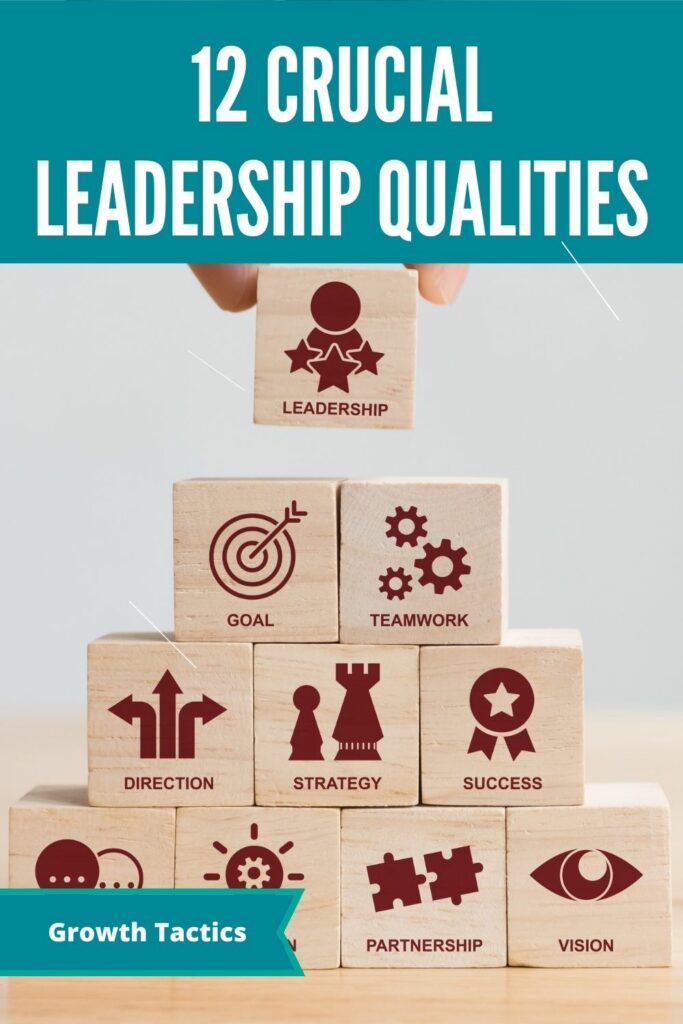Ready to level up your leadership game? Get ready to discover the 12 qualities of a good leader. No matter if you’re a seasoned CEO or just starting out on your professional journey, these qualities are what set great leaders apart from the rest.
Picture this: you confidently communicate your vision, inspire your team, and navigate challenges with ease. Sounds amazing, right? Well, it’s all possible when you possess these 12 essential qualities.
In this engaging article, we won’t just list these qualities and leave you hanging. Nope, we’ll go a step further and provide you with practical tips and real-life examples so that you can start developing these skills right away. Because we believe in your potential to become a remarkable, successful, and inspiring leader.
So, grab a cup of coffee, get comfortable, and let’s uncover what it truly takes to lead with style, purpose, and awesomeness.
Jump To Section
What’s Leadership?

Leadership is the act of leading a group of people or an organization to either sustain or improve. There are certain leadership qualities that can make them better suited for the job.
These top leadership qualities are important for managers, but managers are not the only ones that these skills are useful for. We are all leaders at some point in our lives.
The bad news is that if you are lacking many of these qualities you may struggle to lead effectively. But, the good news is there are ways you can improve and build these leadership skills and characteristics of a leader.
You can build these leadership qualities and become a better leader. Whether you are new to leadership or an experienced vet, there is room for improvement.
Contrary to popular belief, all great leaders aren’t born with all of these leadership qualities. Many times they are learned through experience and training.
I hope to provide you with the knowledge and skills to improve as a leader. By passing on some knowledge and experiences I’ve gained throughout the years.
Top Leadership Qualities – Leadership Skills List

Leadership Quality #1. Problem-Solving Skill
Why this leadership skill is important?
When a problem occurs, team members are going to look to you as the leader for a solution. This doesn’t mean you need to have the answer every time, but you need to at least have a direction for the team. When a leader lacks problem-solving skills, the team can get stuck on every issue that arises.
How to enhance this leadership quality.
Remarkable leaders take a step back and define the problem. This is a vital step that many people skip when a problem occurs. Once you define your issue, you can begin brainstorming. Brainstorming is best with multiple people. Typically, this will lead to many solutions and allow you to choose the best.
Furthermore, increasing your ability to think outside the box is another way to enhance this skill set and increase your leadership abilities. Getting creative will increase this ability. Drawing, writing, and any other creative activity will make you better at thinking outside the box.
In addition, logic puzzles and games are another great way to build your problem-solving skills. Games like chess, crossword puzzles, and Sudoku are great ways to work out this area of your brain.
Leadership Quality #2. Resilience
Why this leadership trait is important.
Resilience is a crucial characteristic of any great leader. It is the ability to recover quickly from setbacks and disappointments, and to keep pushing forward when things don’t go as planned. Adversity is inevitable in any organization, and how a leader responds to it can greatly impact the morale and productivity of the team.
A leader who is strong and resilient in the face of adversity can provide guidance and support to their team, helping them to stay focused and motivated to overcome challenges. A leader who crumbles under pressure, on the other hand, can sow fear and uncertainty among their team, leading to decreased morale and productivity.
How to improve this trait.
One way to improve the resilience trait is preparation. Have a plan for things that don’t go the way you expected. You can’t plan for everything and need to be adaptable. Planning for as much as you can good and bad will put you in a position where damage is limited when things go wrong.
Another way to improve your resilience is to change the way you think about setbacks. When you think of a setback as the end of the world it is hard to overcome. If you think of it as a hurdle to overcome, it is a lot easier to come out better on the other end.
Remember that this is not the first tough situation you’ve faced, and it won’t be the last. You made it through all those, and you can make it through this one.

Leadership Quality #3. Communication Skills
Why this leadership skill is important.
Good communication skills are important for many reasons. Therefore, as leaders, we need to be able to properly communicate with our subordinates, our supervisors, our peers, our customers, and many other people. Of all the leadership qualities, this one can make or break a leader.
Communicating properly enables you to communicate your vision to your team. Great communication skills also allow you to build connections with those around you. This network can be very useful in your journey to becoming the best leader you can be.
How to develop this leadership skill.
Experts say 93 percent of communication is not what is said but how it’s said with tone and body language. Understanding body language and tone and relating it to your communication is a great way to improve this skill.
Learning how to build more rapport is another way to be a better communicator. Building rapport makes others feel more comfortable around you and builds relationships. When you have rapport, your words are understood and internalized more by the other person.
Another way to improve your communication is to always know your audience. You wouldn’t talk to your boss the same way you would with your subordinates or peers. At least you probably shouldn’t be talking to all these people the same way.
To learn 15 ways to master your communication skills click here.
Leadership Quality #4. Accountability
Why this leadership trait is important.
Accountability means accepting the fault for your actions. As a leader, this is not limited to your actions, it also means being accountable for your team. It’s always better to admit when you mess up or make the wrong call. Everybody messes up, but what separates good leaders from the pack is how they handle it.
How to improve this leadership quality.
Own your mistakes and learn from them. Instead of trying to make excuses or ignore your faults, recognize them. When your team succeeds or fails you must take accountability. A good leader takes more than their share of the blame for failures and setbacks and gives others credit during successes. When you do this, you build loyalty within your team, and they will do everything they can to make you a success.
Leadership Quality #5. Integrity
Why this leadership trait is important.
This is one of our core values in the Air Force, and one of the vital leadership qualities. We define integrity as doing the right thing even when nobody is looking. A great leader must be trustworthy. Subordinates need to know that their leader is going to do everything in their power to do what they say.
How to develop this trait.
You set an example for your employees to follow, so integrity is a must. Always do your best to follow through with what you say you are going to do. Don’t do anything you wouldn’t want your subordinates to do like showing up late for work or leaving early without cause. Don’t take advantage of your position. To enhance your integrity and exhibit great leadership, you have to have the mindset to maintain integrity in all you do.

Leadership Quality #6. Vision
Why this leadership skill is important.
Successful leaders have a vision. A solid vision not only guides you as a leader but also gives the team something to strive for. Having a vision provides a sense of purpose for the team and defines short and long-term goals. Your vision as a leader will inspire others to be better and work harder toward your common goals.
How to improve this skill.
What are your goals for the future of your organization? Think about your short and long-term goals. Visualize yourself in this future and think about what it will take to get there. Share your vision of the future with those around you and work on getting them to visualize this future as well.
A great way to get your message about your vision out is by creating a vision statement. Follow the link to create a vision statement to motivate and inspire your employees.
Leadership Quality #7. Confidence
Why this leadership trait is important.
As a leader, you will sometimes have to take risks. It’s important to have confidence in yourself and your team when taking risks. You have to have the confidence to make decisions even if you don’t have all the information to make a guaranteed decision. Without confidence, you will second guess yourself at every turn. This can lead to a lot of wasted time and added stress. If you make a wrong call, it’s not the end of the world. You need to focus on fixing the situation instead of dwelling on the error you made.
How to develop this leadership skill.
Having a good plan will help your confidence. When you have a path to proceed, even when things aren’t going your way, you are more confident.
Another way to build confidence is to look in the mirror and tell yourself all the good things you have to offer the world. Confidence depends on how we talk to ourselves. If you talk to yourself positively, your confidence will soar. Neurolinguistic programming is full of great techniques for improving the way your inner voice talks to you.
Always remember, there’s a reason why you are the leader. Others saw something in you, or you wouldn’t have made it to the position you’re in.
Leadership Quality #8. Sound Judgement
Why this leadership skill is important.
As leaders, we have to make decisions, and we don’t always have all the information to make the guaranteed correct call. You may have to decide on which candidate to hire or which vendor to go through for materials. You may have to decide when is the right time to cut your losses on a project. All these decisions have a correct answer, but you typically won’t know until after the choice is made. This is where sound judgment is vital for a leader.
How to improve this leadership skill.
Believe it or not, decision-making and sound judgment are skills that can be built or strengthened. The first thing you want to do is explore all options. You may even want to brainstorm to come up with new and better options. You can do this with a team to get even more ideas that you may not have thought of on your own.
Some decisions are very time-constrained but many times we rush into them. Take a moment to think about how urgent this decision is. If you have the time, take it to weigh your options and possible outcomes. Just be careful to not take too much time because indecisiveness can be an issue too.
Another great technique is to visualize yourself making each choice. You have to picture yourself and experience the outcome of the choice. This can open your eyes to outcomes of the choice that you may not have thought of yet.
Leadership Quality #9. Humility
Why this leadership trait is important.
While confidence is important in a leader, overconfidence can be very detrimental to you as a leader. It’s important to have humility and be able to admit when you are wrong. Recognize that you have flaws and weaknesses. That’s okay because there is not a perfect person alive. Showing humility and being able to admit when you are wrong, shows everyone around you that you can be trusted. It also shows subordinates that it’s okay to have problems. They will be more open with you when they arise instead of trying to cover them up.
How to develop this quality of a good leader.
You can develop this leadership trait by performing self-reflection. When things go wrong, don’t blame everyone else. Take a look inside and ask yourself what you could have done differently. As a leader, many of the team’s mistakes fall on your shoulders. When talking to your team about errors, admit that you are at least partially to blame. You don’t have to beat yourself up over the mistakes but use them to be better and stronger for the future.

Leadership Quality #10. Positivity
Why this leadership trait is important.
Have you ever noticed how things just seem to go your way when you have a good day? The opposite can be said for a bad day. When you have a positive mindset it’s much easier to make better decisions and not get stressed out. Your team will often take on the attitude you have and a positive one will allow everybody to perform better.
How to improve this trait.
There are many things you can do to maintain a positive mood. Starting your day off right with enough sleep can help you stay in a better mood. Having good goals and a good vision to guide you can keep focused and in a good mood. Staying physically and mentally fit will help you maintain a positive attitude.
Leadership Quality #11. Empathy
Why this leadership skill is important.
Empathizing with your employees is important to truly get to know your employees, your bosses, and your customers. To be a great leader you need to be able to get into other people’s shoes. This will help you understand what your supervisors want from you. It will allow you to know what motivates your subordinates. Also, it will give you insight into what your customers want. Furthermore, this skill will help you build long-lasting relationships and bonds with those around you.
How to develop this leadership skill.
Empathy can be improved and increased by taking a walk in other people’s shoes. That means you get to know those around you. Spend time talking to them and finding out what makes them the individual they are. Always make an effort to take others’ feelings into account. Even when you have to have difficult conversations with employees, you can do it in a way that accounts for their feelings. One final tip is to always try to bring a few thoughtful conversations to each conversation.
Leadership Quality #12. Motivation
Why this leadership trait is important.
The best leaders are motivated. Motivated to make a difference, motivated to give their all, and motivated to be the best leader they can be. The team will feed off your motivation, making them more focused and productive. When you are motivated to be great, your team will be motivated to get you there.
How to develop this trait.
Developing this trait requires you to do a little soul-searching. Why do you do what you’re doing? Who are you doing it for? Do you want to make a difference? Ask yourself these questions and be honest with yourself to find out what motivates you.
Setting strong goals and working toward those goals can help with motivation. Creating a strong vision statement will also help be a motivator to both you and those around you. A vision board is another thing that can help keep you motivated.
How to Improve Your Leadership Skills

Set Clear Goals and Expectations
Leadership begins with setting clear goals and expectations for yourself and your team. Clearly communicate what you expect from each team member, including their roles, responsibilities, and performance expectations. By setting clear goals, everyone will be on the same page and working towards a common purpose.

Enhance Communication Skills
Effective communication is a fundamental aspect of leadership. To improve your leadership skills, focus on enhancing your communication abilities. This includes active listening, providing constructive feedback, and clearly articulating your thoughts and ideas. Regularly check in with your team members to ensure that everyone is aligned and informed.
Develop Emotional Intelligence
Emotional intelligence is key to successful leadership. It involves understanding and managing your own emotions while empathizing with others. By developing emotional intelligence, you’ll be able to build stronger relationships with your team members, resolve conflicts more effectively, and create a positive work environment.
Continuously Learn and Grow
Leadership is a journey of continuous learning and growth. Seek out opportunities for personal and professional development, such as attending seminars, reading leadership books, or engaging in online courses. Embrace feedback and take it as an opportunity to improve and evolve as a leader.
Delegate Tasks and Empower Others
To be an effective leader, it’s crucial to delegate tasks and empower your team members. Identify each individual’s strengths and assign tasks accordingly. Provide support, guidance, and resources to help them succeed. By empowering others, you not only build their skills and confidence but also foster a culture of trust and collaboration.
Lead by Example
Leadership is not just about giving orders; it’s about setting an example for others to follow. Demonstrate the values and behaviors you expect from your team members. Be accountable, dependable, and ethical in your actions. When you lead by example, you inspire and motivate others to do the same.
Foster Teamwork and Collaboration
Strong leadership involves fostering teamwork and collaboration within your team. Encourage open communication, idea sharing, and mutual respect among team members. Create a supportive environment where everyone feels valued and empowered to contribute their best.
Seek Feedback and Self-Reflection
Regularly seek feedback from your team members, peers, and mentors. Actively listen to their perspectives and use their feedback as an opportunity to improve. Engaging in self-reflection is also beneficial for leadership development. Take time to assess your strengths, weaknesses, and areas for growth.
Improving your leadership skills takes time and dedication. By incorporating these strategies into your leadership approach, you’ll develop into a more effective and influential leader, driving success for yourself and your team.
Embrace the Power of Growth: Why a Growth Mindset Shapes Exceptional Leaders
The Foundation of Leadership Growth
Great leaders aren’t born; they’re made. At the heart of their journey lies a growth mindset. Those with this mindset view challenges as opportunities to improve. They understand that hard work and perseverance lead to the development of the essential leadership qualities necessary for success.
Growth Mindset: Breeding Ground for Leadership Traits
A growth mindset encourages continuous personal development. Leaders who embrace it seek new ideas and strategies, pushing beyond the comfort zone. They make difficult decisions during difficult times, always with an eye on personal growth. This mindset is critical in cultivating leadership traits such as adaptability, resilience, and innovation.
Creating a Legacy of Positive Influence
Leaders with a growth mindset set a good example for their staff members. They become role models, showing that it’s possible to evolve and enhance one’s leadership role. Their approach to learning and improvement fosters a culture where the entire team strives to do their best work.
Fostering a Shared Vision
A leader who champions growth ensures the entire team is on the right path. By valuing each member’s ideas and perspectives, a shared vision emerges. This collective journey not only achieves better results but also promotes a spirit of unity and cooperation.
The Path to Outstanding Leadership
In conclusion, adopting a growth mindset is the first step toward becoming an excellent leader. It’s about being open to new things, leveraging effective leadership skills, and making strategic decisions. Leaders who embody this mindset will inspire others, fostering an environment ripe for success and positive change. Embrace growth, and watch your leadership qualities flourish.
Essential Leadership Styles of Effective Leaders
Effective leadership is essential for any organization that wants to succeed in today’s fast-paced and competitive business world. A great leader can inspire and motivate their team to achieve great things, while a poor leader can demotivate and disengage their team, leading to poor performance and low morale.
One of the keys to effective leadership is understanding the different available leadership styles and knowing when to use each one. Here are some of the essential leadership styles that effective leaders should be familiar with:
Autocratic Leadership
Autocratic leaders make decisions without input from their team members. This style can be effective in situations where there is a clear direction that needs to be followed, but it can also lead to feelings of resentment and disengagement among team members.
Transformational Leadership
Transformational leaders inspire and motivate their team members to achieve their full potential. They encourage creativity, innovation, and collaboration, and they are able to create a sense of shared purpose and vision.
Servant Leadership
Servant leaders focus on serving their team members rather than being served themselves. They prioritize the needs of their team members and work to create an environment of trust, respect, and collaboration.
Laissez-Faire Leadership
Laissez-faire leaders delegate decision-making authority to their team members and allow them to work independently. This style can be effective in situations where team members are highly skilled and motivated, but it can also lead to a lack of direction and accountability.
Democratic Leadership
Democratic leaders involve their team members in the decision-making process and seek input and feedback from them. This style can be effective in situations where there are multiple perspectives that need to be considered, but it can also lead to slower decision-making.
Effective leaders are able to use these different leadership styles as needed, depending on the situation and the needs of their team. They are also able to adapt their leadership style over time as the needs of their team and organization change.
Who Can Be a Good Leader?
Leadership is a quality that is not confined to any specific group of people. Anyone can become a good leader if they possess the right attitude, skills, and qualities. It is commonly believed that leaders are born, not made, but the truth is that leadership is a skill that can be learned and developed over time.
A good leader is someone who has a clear vision, is able to inspire and motivate others, has strong communication skills, is adaptable and flexible, and is able to make tough decisions when necessary. They are also someone who is self-aware, able to manage their emotions, and has a high level of emotional intelligence.
While some people may naturally possess some of these qualities, they can also be learned and developed through training and practice. It is important to note that being a good leader does not necessarily mean that you have to be in a position of authority or have a specific job title. Good leadership can be demonstrated in any setting, from the classroom to the boardroom, and in any industry or profession.
In conclusion, anyone can be a good leader if they possess the right attitude, skills, and qualities. It is a skill that can be learned and developed over time, and it is not limited to any specific group of people. The key is to be self-aware, have a clear vision, and be able to inspire and motivate others toward a common goal.
Final Thoughts on Top Leadership Qualities
It’s not necessary to be exceptional in all these areas to be a great leader. But the more of these qualities and traits you exhibit the better you will be. I hope this article made you take a look inside yourself. Start thinking about which areas of leadership you excel in and which leadership areas you could use a little work.
If you think you are perfect and there is no room for improvement you need to read number 9 again. Every one of us has areas we can improve. Neither I nor you will be perfect, but that shouldn’t stop us from trying to get as close as we can. What leadership qualities do you think should be added to the list?
If you enjoyed this article on the 12 qualities of a good leader and how to improve your leadership abilities, please share using the buttons below.


